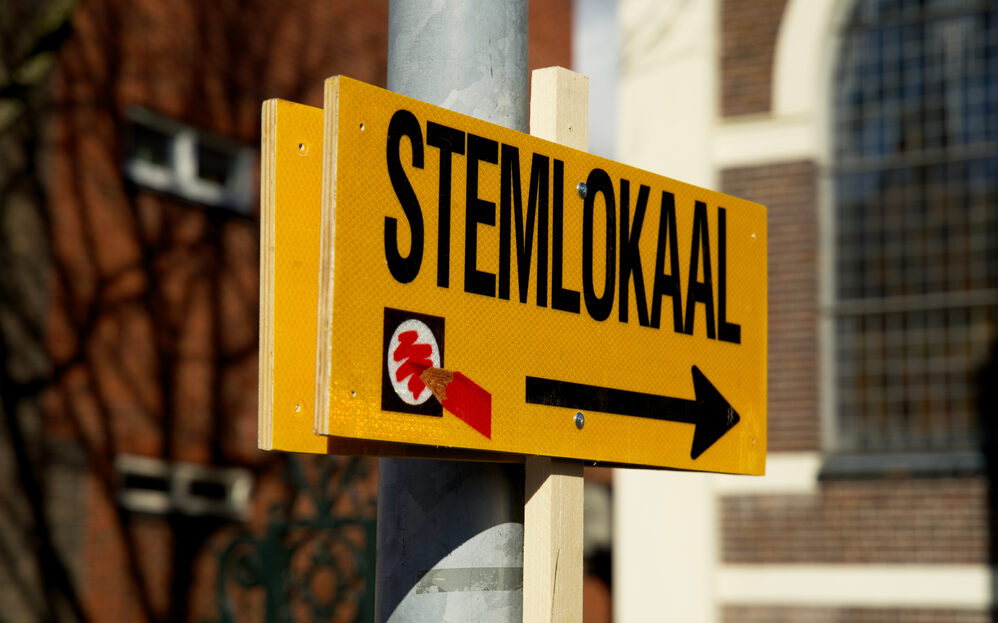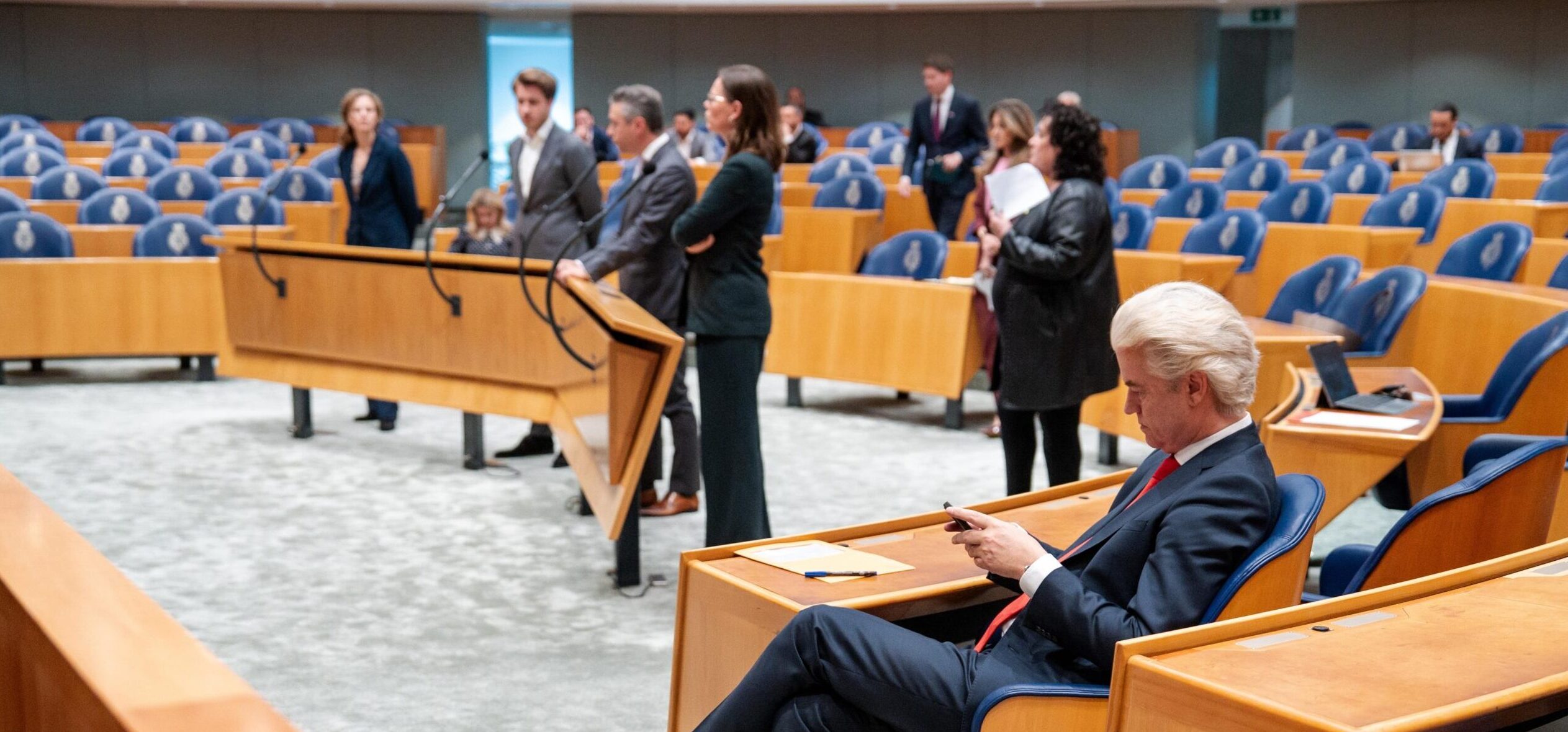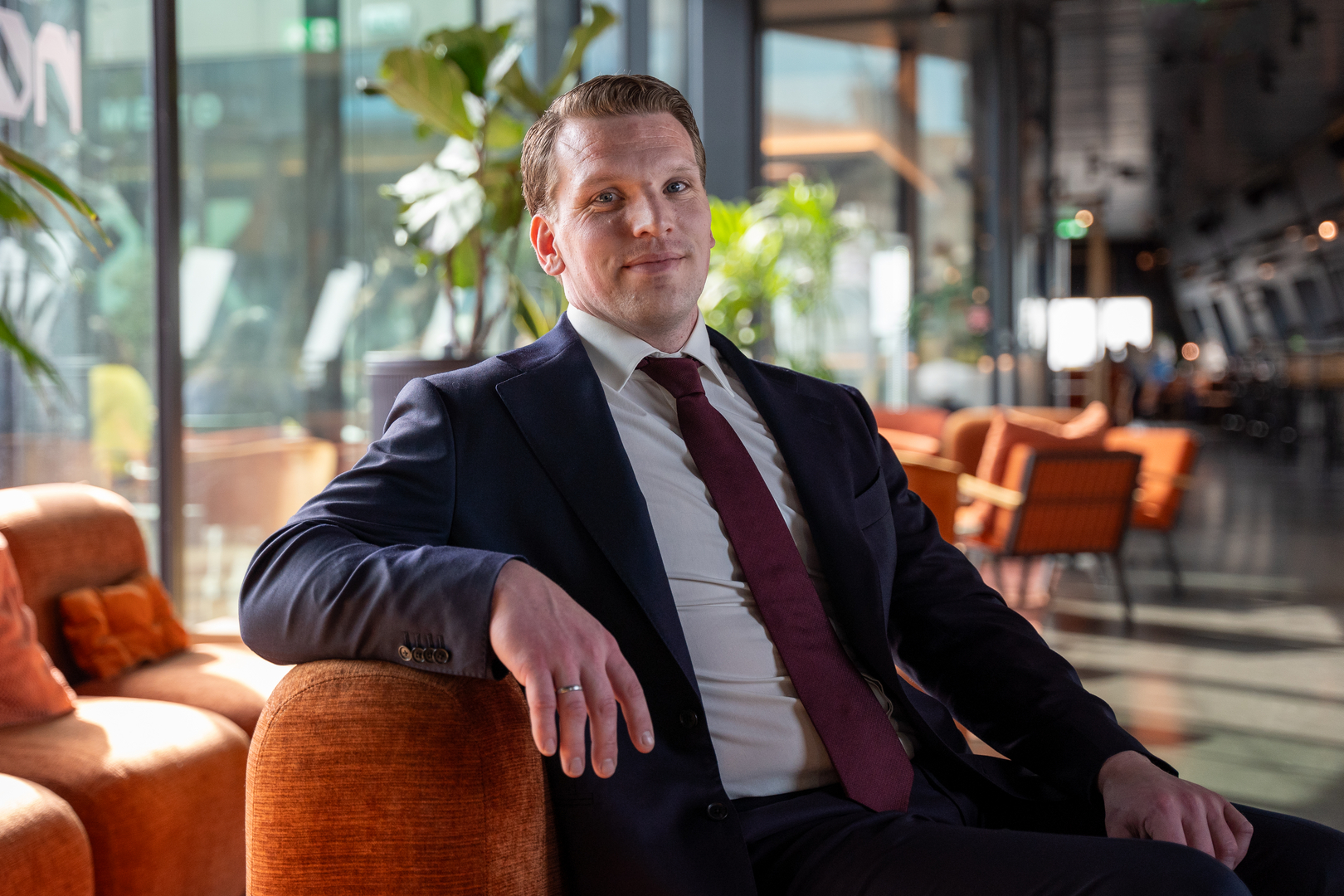There were a few raised eyebrows when he was appointed. What was a member of the right-wing liberal party VVD doing as the mayor of left-wing Wageningen? But Floor Vermeulen soon grew to become a familiar face in the town by turning up everywhere with infectious enthusiasm. He joined the protests against the Schoof government’s cuts in education and has highlighted the issue of youth welfare. We talk to him about safety in the streets, the taboo surrounding depression and his socialist family background.
Floor Vermeulen started his first term of office as mayor of Wageningen in June 2021, aged 36. His first real contact with WUR students was in August that year, during the AID introduction week. ‘At the AID, I welcome the new students to Wageningen. I always do that together with the rector. It’s an opportunity for me to look everyone in the eye for a moment. It’s great because you will bump into nearly all of them again in the town, especially if they do both their Bachelor’s and Master’s here.’
During his welcome speech, Vermeulen always invites students to get actively involved in town life. ‘Don’t just be a visitor, be part of the town. A lot of students do indeed do that, with projects like Grandma’s Soup where students and senior citizens make soup and play games together, or by helping with a sports day for people with a disability or volunteering on Liberation Day.’
When I see the tall blocks of flats, I feel I am back home
Equally, Vermeulen tries to be there for Wageningen’s students. ‘If students organize something, if a student society wants to make its premises more sustainable or if they have something to celebrate and invite me, I always try to turn up. That can be tricky for the work-life balance and it can be a headache for the secretaries, but there you go.’
What kind of a student were you?
‘I got my Bachelor’s in Politics in Leiden in the set number of years, while doing all kinds of extracurricular activities such as serving on the programme committee and faculty council. But I got stuck doing the Master’s and I never actually completed it. It’s the classic problem: I passed all my courses but never handed in my thesis. By then I was the party leader in the Provincial Council so I simply didn’t have time any more.’
You became mayor at age 36 and before that you were involved in provincial politics for 14 years. So you started young. How did that come about?
‘I come from a politically engaged family. My father was one of the first tree nurserymen to get involved in the Ornamental Plant Environmental Project, where they tried to reduce the environmental impact of the sector by using natural pest control methods such as parasitic wasps. My mother was a teacher. She was involved in the PSP, a predecessor of GroenLinks, the Dutch Green party. My grandmother’s family had been supporters of Ferdinand Domela Nieuwenhuis, the first anarchist in Dutch politics. My grandmother was my biggest fan: she would never have voted for my party, but she did vote for me when I was on the list. When I became a member of the Provincial Executive of Zuid-Holland, I bought a statuette of Nieuwenhuis as a souvenir. It is still in my office and keeps an eye on me to make sure I don’t forget my socialist family roots.’
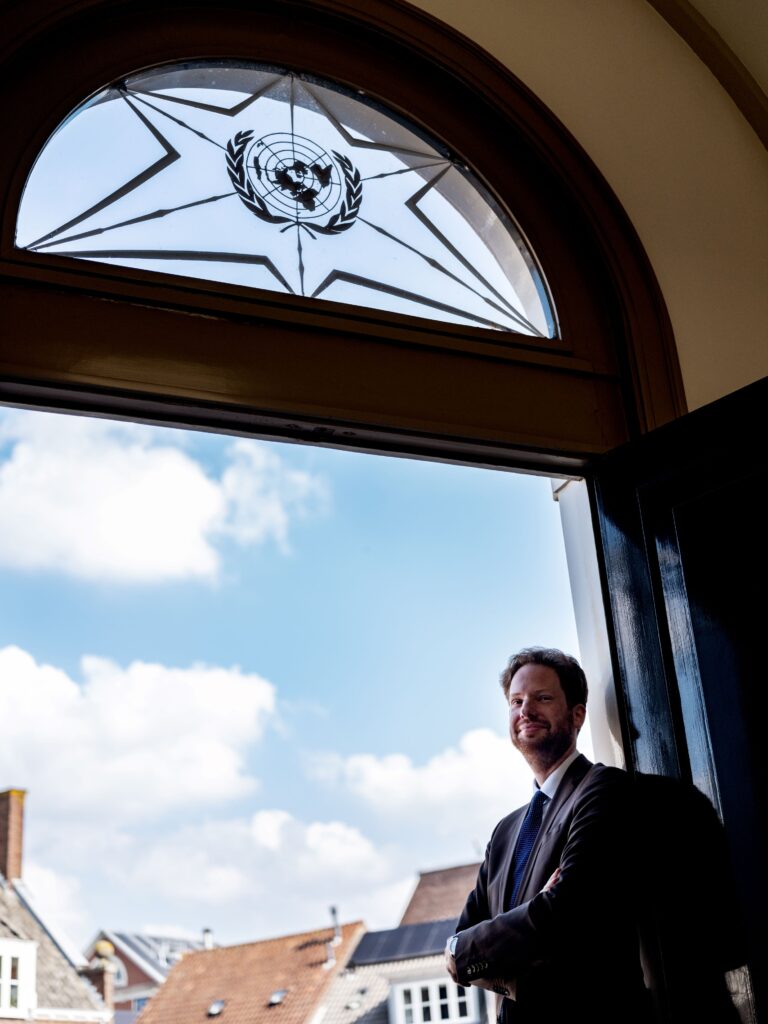
Given that background, how did you end up in the VVD?
‘When I was young, I read a lot about liberalism, which stresses the importance of freedom and the responsibility of the individual. To be open about my situation, my father died when I was 11 and we didn’t get a widow’s pension or orphan’s pension because my parents weren’t married. The law was changed one month later — rightly so — but our family had to make do as best we could. The three of us worked hard and survived. That gave me the firm conviction that in the end you have to be able to look after yourself in life.’
You lived almost your entire life in Boskoop, Zuid-Holland, and now you have been mayor of Wageningen for four years. Do you feel at home here yet?
‘Definitely. When I drive into Wageningen from Ede and see the tall blocks of flats and the campus, I feel like I’m back home. The town has everything: a cinema and a theatre, markets twice a week, good shops, friendly cafes and lots of volunteers who keep the place going. There is a lot of churn — 10 per cent of the residents are new each year — but there is still a sense of community. That’s only possible because people are welcoming to one another.’
Safety in the streets has become a hot topic recently, both nationwide and in Wageningen specifically. Last year, a PhD candidate was assaulted on campus, which made a lot of international students no longer feel safe in Wageningen. There have been stories of harassment in the streets more recently too (see page 5).
‘Awful. Fortunately, three people were detained for that assault and two received sentences (the third suspect was a minor and was acquitted by the juvenile court, ed.). It shows perpetrators won’t get away with it: they will be punished and get a criminal record. However, I think the victims often have to wait too long for a verdict. There aren’t enough judges, detectives or public prosecutors. That is worrying. This case took longer than one year. I can imagine the victim thinks: deal with those guys! But in the Netherlands you’re only a suspect until you have been sentenced.’
Victims have to wait too long for a verdict.
‘In view of the concerns of some of the international students, we organized a meeting about safety together with the police and the university. We also explained there how the Dutch legal system works. Perhaps we should do that more often given that there are so many international students, who are often used to different legal systems. And perhaps we should reflect as a country on whether our approach to ensuring safety is still appropriate in modern times.’
‘I’m worried about the lack of police capacity. I was told two years ago that I would be getting fewer police officers. There is a shortfall of 800 million euros nationally. OK, but what if things get out of hand here? Then we’ll automatically get more police, they said. But of course then it’s too late. That makes no sense. As a country, we should invest more in law and order.’
You chair NKN, the network of university towns, where you aim to put the theme of youth welfare on the agenda. Why is that important?
‘Since I became mayor, there have been four student suicides. I am deeply affected by that, at the personal level too because that’s how I lost my own father. I am impressed with how students are taking the initiative to break the taboo on depression. For example, Ceres organized the symposium on suicidal thoughts last May in the Grote Kerk. That very week, someone took the decision to end their life, which was so sad. But the symposium still went ahead. I am really proud of how Ceres dealt with that. That applies to the other societies that have had to confront this as well.’
We find mental health a difficult subject in the Netherlands.
‘We find mental health a difficult subject in the Netherlands, but that makes it all the more important to talk about it. You might have a heart attack or you might suffer from depression. The question is how you recover from that. If someone has a heart problem and they have an operation, we accept the recovery will take time and we ask how things are going. But if someone has mental problems, we find it all a bit complicated. But depression is just another illness, one we should take equally seriously and talk about with the same concern and openness, and give people the time they need to recover.’
In that area too, we see the national government wanting to do less.
‘Everyone says they find youth welfare important, but we are still seeing cuts to the funding of the Trimbos Institute, which plays a key role in stopping excessive use of drink and drugs. We will see the consequences of that in a few years’ time. Then the municipalities will be told to sort it out.’
Last year, you spoke out against the cuts in higher education in various ways, for example in an interview in the NRC newspaper and by taking part in a protest in The Hague.
‘The university is incredibly important to Wageningen. Students make up a quarter of our population, and then there are the staff on top of that. In addition, the major innovations made in the past weren’t achieved through cutbacks. Smart countries invest in knowledge, innovation and education. The current government is cutting back on these areas and is trying to restrict the influx of highly skilled migrants even though we need them for the future of our country.
Major innovations in the past weren’t achieved through cutbacks.
‘I try to get that message across, even if I sometimes feel like I’m talking to a brick wall. Fortunately, companies such as ASML are able to get through to the government sometimes. But there other sectors we should be proud of and that need investing in. So I will continue to speak out. If nobody is listening now, they might in the future because there will eventually be a new government.’
How do you feel about the relationship between the town and the university?
‘The relationship is good; we take one another seriously. We have regular meetings with the Executive Board, so we will always be able to discuss things if there ever is an issue. Every week, we discuss matters such as student welfare, the cuts, real estate and the business climate. There are also nice initiatives such as Scientists at the Market, which brings WUR people into contact with locals, or Wageningen 2120, the vision for the town’s future drawn up by Tim van Hattum.’
The elections are soon. You mentioned a lot of areas where more investment is needed, from education and innovation to youth welfare and safety. What should be the new government’s first task?
‘We live in times where there is an unprecedented lack of trust in national politics. I hope the new government will restore calm and take a long-term perspective. Invest in the future of the country, in innovation and education and in sectors where we lead the way to make us even better. What are we waiting for? Other countries and continents aren’t hanging around. We have a Delta Programme Commissioner to protect the country from flooding. Now we need an Innovation Commissioner who transcends individual ministries and can say what needs doing to keep the Netherlands innovative.’
‘At the same time, we need to invest in security and defence. That too costs money. But investments in innovation help strengthen the economy, and then you have more money to spend on defence. You should be doing both.’
CV Floor Vermeulen
1984 // Born in Boskoop
2004-2007 // Bachelor’s in Politics, Leiden
2007-2015 // Member of the Provincial Council
2015-2021 // Member of the Provincial Executive of Zuid Holland
Since 2021 // Mayor of Wageningen
If you have suicidal thoughts or are worried about someone else, talk about it. The 113 helpline is staffed 24/7. You can phone 0800-0113 or chat via 113.nl. It’s free of charge and completely anonymous.

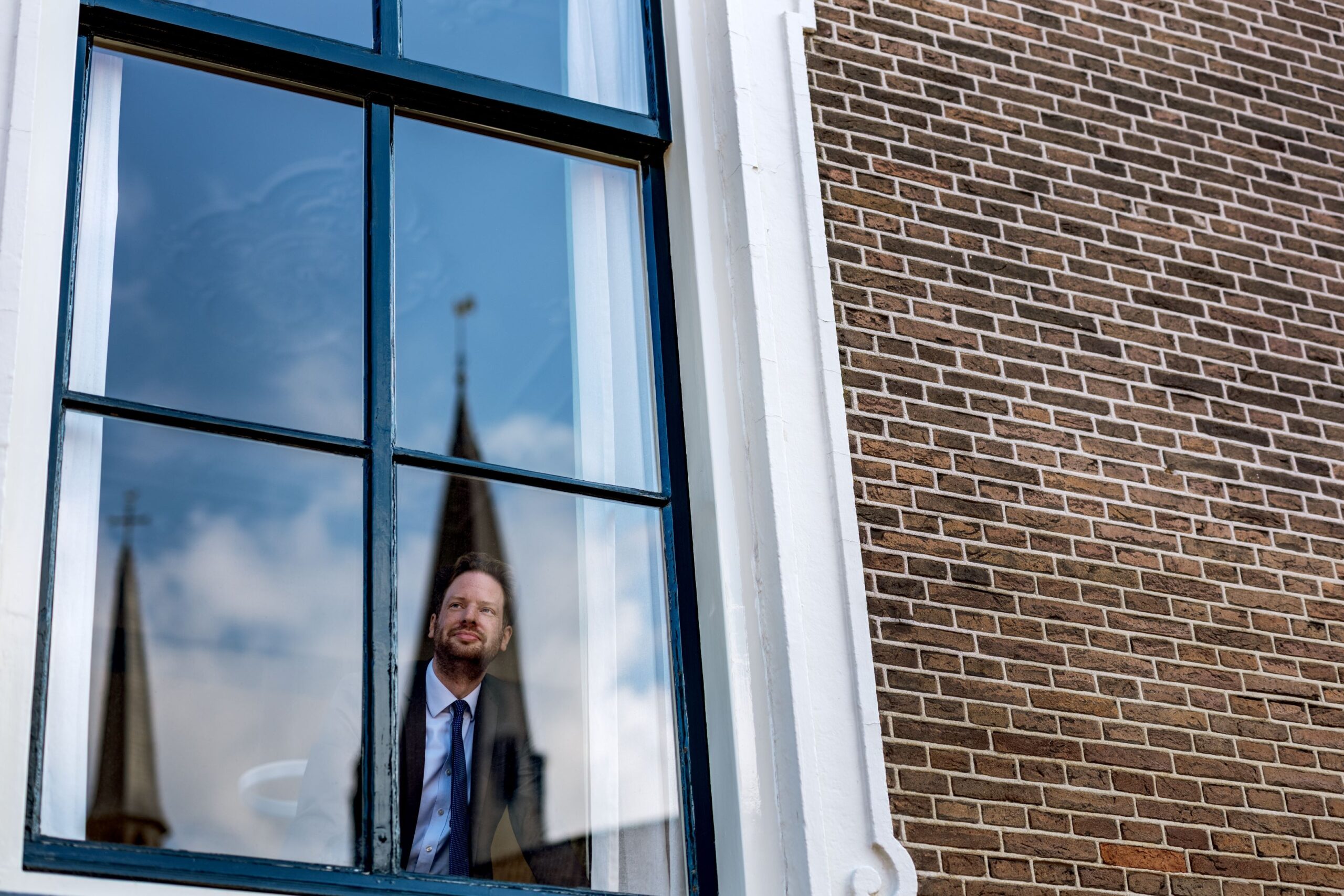 Mayor Floor Vermeulen. Photo Duncan de Fey
Mayor Floor Vermeulen. Photo Duncan de Fey 